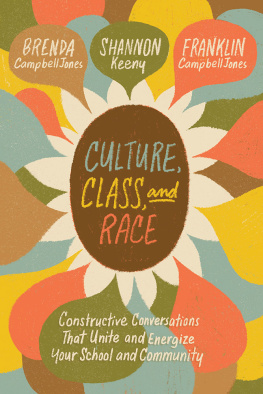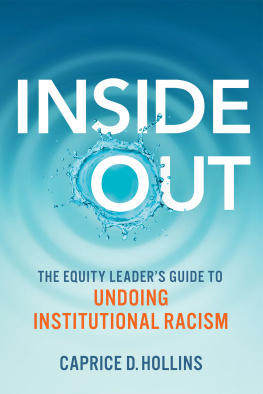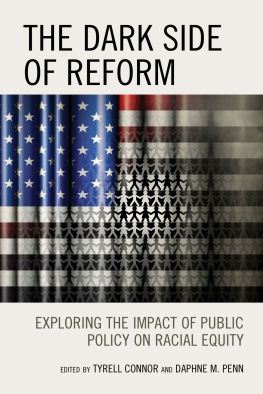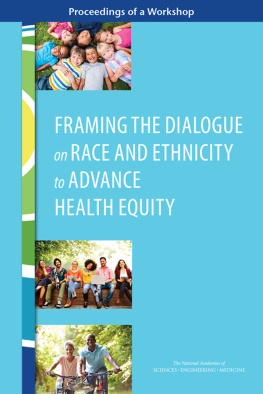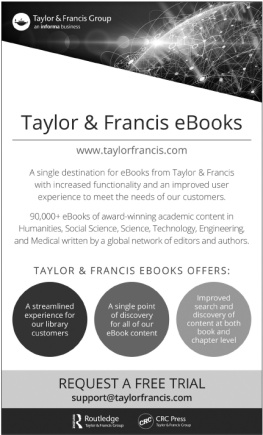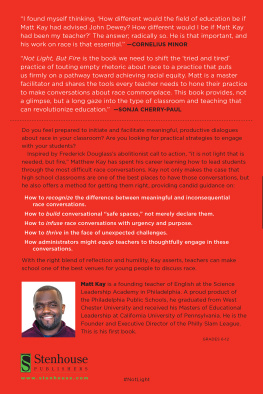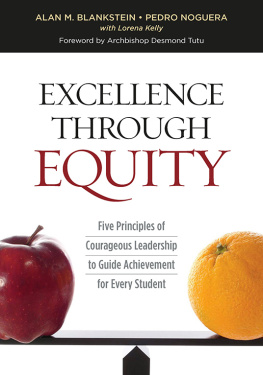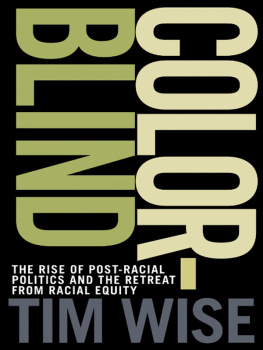MORE
COURAGEOUS
CONVERSATIONS
ABOUT RACE
All our philosophy is dry as dust if it is not immediately translated into some act of living service.Gandhi
This book is dedicated to the courageous leaders who passionately, practically, persistently, and purposefully usher in the Courageous Conversation About Race in their classrooms, schools, and districts and are getting the results.
You know exactly who you are and so do our children!
This book is also dedicated to President Barack Obama who provided for me a much-needed second wind as well as the audacity to keep on hoping!
MORE
COURAGEOUS
CONVERSATIONS
ABOUT RACE

GLENN E. SINGLETON
Foreword by James P. Comer


FOR INFORMATION:
Corwin
A SAGE Company
2455 Teller Road
Thousand Oaks, California 91320
(800) 233-9936
www.corwin.com
SAGE Publications Ltd.
1 Olivers Yard
55 City Road
London EC1Y 1SP
United Kingdom
SAGE Publications India Pvt. Ltd.
B 1/I 1 Mohan Cooperative Industrial Area
Mathura Road, New Delhi 110 044
India
SAGE Publications Asia-Pacific Pte. Ltd.
3 Church Street
#10-04 Samsung Hub
Singapore 049483
Acquisitions Editor: Dan Alpert
Associate Editor: Megan Bedell
Editorial Assistant: Heidi Arndt
Production Editor: Cassandra Margaret Seibel
Copy Editor: Jackie Tasch
Typesetter: C&M Digitals (P) Ltd.
Proofreader: Susan Schon
Indexer: Judy Hunt
Cover Designer: Michael Dubowe
Permissions Editor: Karen Ehrmann
Copyright 2013 by Glenn E. Singleton
All rights reserved. When forms and sample documents are included, their use is authorized only by educators, local school sites, and/or noncommercial or nonprofit entities that have purchased the book. Except for that usage, no part of this book may be reproduced or utilized in any form or by any means, electronic or mechanical, including photocopying, recording, or by any information storage and retrieval system, without permission in writing from the publisher.
All trade names and trademarks recited, referenced, or reflected herein are the property of their respective owners who retain all rights thereto.
Printed in the United States of America
A catalog record of this book is available from the Library of Congress.
ISBN 978-1-4129-9266-4
This book is printed on acid-free paper
12 13 14 15 16 10 9 8 7 6 5 4 3 2 1
Contents
Foreword
James P. Comer
Foreword
Can We Talk About Race?
T he United States of America is a remarkable nation. Birthed in two polar-opposite beliefsfreedom and slaveryand possibly a bit of genocide, it has moved slowly and fitfully to become the largest and most powerful, diverse, and compassionate democracy in the history of the world. But it is now being challenged for its leadership position by other nations, and currently is limited by a growing sense of confusion within (or perhaps an identity crisis). The long-term downside of this quandary could be a reduction in the commitment to freedom that has made our nation exceptional.
Aspects of our economic situation are both the probable problem and the potential solution. Throughout human history, achieving a state in which most people could survive and thrive most of the time has had limited success. As a result, human nature has often led to aggressive and destructive interactions such as mans (or humankinds) inhumanity to man (humankind), from minimal to extreme. But despite slavery, the abuse of Native Americans, and the stigmatization of certain groups of immigrants, and because of a slow but sustained effort to live up to the principles of our founding documents, we Americans established an identity of inclusion, belonging, a commitment to human rights, and opportunity for all. This accomplishment made us not only the economic leader but also a moral leader in the world. This combination and the resultant stability were mutually beneficial, making us a global, economic, and human rights safe haven.
The challenges to our leadership began to arise in large part from the effects of rapid global, scientific, and technological changes coupled with an inadequate effort to prepare a large majority of our young people to function well in this new and future world. The new economy and open technology-based society requires not only well-educated but also well-developed and well-functioning people among all our diverse groups. Yet we allowed too many to fall behind over the past 50 years, and the students who are falling behind are disproportionately poor and marginalized African Americans, American Indians, and Hispanics and poor Whites and Southeast Asian Americans. The American students not among those groups are achieving above most other students in the world.
Academic underperformance closes the mainstream workforce pipeline and invites able young people to engage in illegal financial and lifestyle activities, thus engendering the all-too-familiar list of social problems that threaten our nations overall well-being. And while many economic and political leaders worry about the failure of our top students to compete with others, the real danger lies in the fact that too many able students are not getting a chance to compete in our own economic mainstream, much less the global economy. The resultant social problems are the real threat to Americas future.
During the same 50 years that the gap in preparation and performance has been growing, the evidence that most poor and marginalized young people can achieve at a significantly higher level has also been growing. But instead of building on this evidence, our nation has been focusing on accountability issuesand without widespread success. To promote what we need nationwide, we must make urgent, very significant, and complex political, technological, and social changes. This is more urgent than raising standards and exacting penalties on parents and educators who are not prepared to do what we are asking them to do.
And before we can elevate student performance overall, we are going to need to answer some basic questions about the issues that both stabilize and move or paralyze our society: Who are we? What do we want to become? How do we get there? To do so, we are going to have to talk about racewithout blame or finger-pointing, but in the service of understanding and problem solving.
We have already come a long way over a unique and hugely difficult path. Because of this, we should be proud; and we should ask ourselves how we did it. The American experience is a real-life social and historical petri dish of one of the most successful efforts to manage the human potential for good and evil that has ever existed. But despite what we might learn that could help us help create a better world, we dont want to think or talk about one of the most critical, if not central, features of our American experience.
I dont welcome the idea of talking about race. Most parentsBlack, White, and othersuse a version of dont ask, dont tell when discussing the issue of race with their children. We dont talk about race in a useful way in our education system(s), and even scholars have difficulty talking about it. In schools, it is a short history discussion that rarely if ever focuses on discussions of the psychosocial effects of race on all people and society at large. Often we do not even acknowledge that it is an issue at all or why it is so difficult to talk about.
Next page

